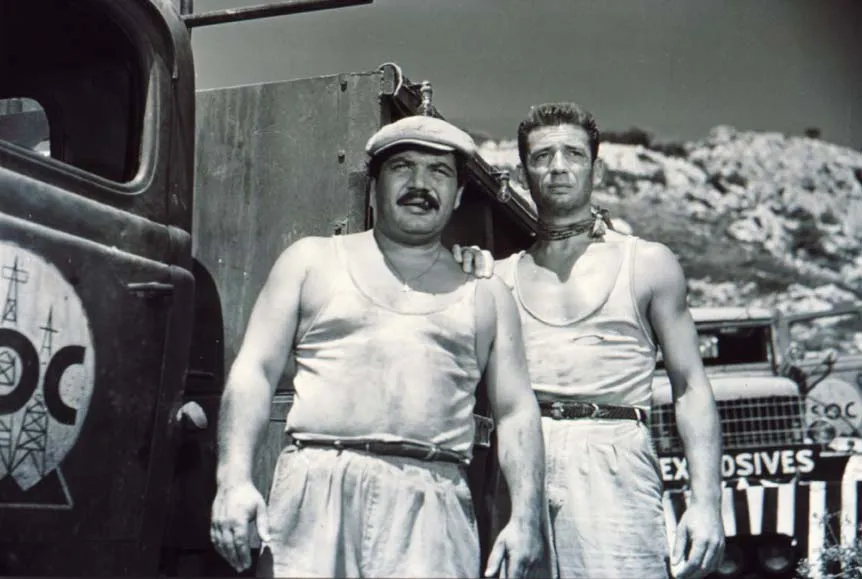“The Wages of Fear” opens in a barren Latin American town where the skies are clear and the humidity is palpable. The town’s geography is never disclosed, but a plane ticket is seemingly the only way out. Wanting exactly this is Mario (Yves Montand), a suave Frenchman without work who loiters around the cantina. Mario treats his lover Linda (Véra Clouzot) and Italian roommate Luigi (Folco Luili) with haughtiness. It’s an ironic situation since they genuinely care for him and are employed — two rare things to come around in the town. It’s only when Jo (Charles Vanel), an aged Corscian with a checkered past, arrives that Mario seems to take an interest in someone other than himself. Also around and about is Bimba (Peter Van Eyck), a quiet German with a world-weary view. When an explosion at the Southern Oil Company’s fields calls for the transportation of nitroglycerine via trucks, the four men find work. The hitch is that a turn too sharp or too much pedal to the metal can cause everything around them to go up in flames.
These events constitute a lengthy, but necessary first half of “The Wages of Fear.” The stretch of lethargy is purposeful, with director Henri-Georges Clouzot establishing the politics of the town’s civics, the ill-fated characters and overall, the calm before the storm. A rewatch and stricter comparison between the introductory first half and unletting second half reveals the necessity of the former’s runtime. Clouzot imbues a lot of humanity during this period, both positive and negative. Mario and Jo are intensely flawed characters, but human nonetheless. The state they find themselves in, financially and geographically stagnate, becomes almost irritable to the point where we can understand their choice to undertake these dangerous jobs, regardless of the numerous signs from the locals and Linda herself that the men should not accept this job. Whether it’s their stubbornness, ignorance or both, it gets the best of them.
With the ingeniously simple stakes laid out, the back half of the film – the men’s trek across mountains to deliver the contact explosive – unfolds as a suspenseful thriller. But, what distinguishes Clouzot’s thriller from the benchmark is the usage of silence. Frank Herbert once stated, “The absence of a thing can be as deadly as the presence,” and this sentiment is certainly true for “The Wages of Fear.” Rather than having the typical eerie, plucking strings or a dramatic orchestra behind it, the images remain unaccompanied. The effect is potent and uneasy as we’re forced to nakedly observe men in brutish, cumbersome pieces of metal maneuver through washboards and other rugged terrains. Scattered throughout the film are some great insert shots that give the whole journey a terrible sense of tactility.
To make matters worse, the men aren’t the most cautious or patient with each other on the job. During a great banter between Mario and Jo, the junior argues that he has the guts to do the job, while the elder pushes back, stating he has the brains and foresight. Mario certainly has the guts, but whether there are any brains in the operation is questionable. Numerous times Jo is seen smoking next to the trucks’ warning sign reading “No Smoking Within 50 Feet.” And inevitably, the nerves from the task at hand get to the pair and they begin to test each other’s competence. As viewers, we couldn’t care less about who’s right or wrong and focus on, rather, what’s in front of them on the road and if their eyes see this.
As the journey labors on and the men overcome obstacles, the film becomes hellish. A scene involving crossing a pit of oil is perhaps the epitome of this, with its excruciating, preventable brutality. Many shots evoke this feeling, whether it’s the ghastly images of the men in the truck, their faces heavily lit and surroundings dim, all that’s visible is their taut, sweaty expressions or the scene where Mario looks up at a towering inferno engulfing the oil rig.
“The Wages of Fear” is a film about a man pitted against himself and the unforgiving natural world. But, going back to the crucial first half, it’s also a film about man against capitalism, and Clouzot isn’t shy about this. The Southern Oil Company’s foreman, Bill O’Brien (William Tubbs) is bluntly characterized. The few times we see the stout man, he’s eating and undercutting the law, giving orders to divert the blame for the explosion. The American operation is not just the only lucrative business in the South American town but has an iron grip on it with impoverished locals forced to earn wages toiling in the oil fields. The town’s melting pot of backgrounds, as evident in the four men, is no coincidence – it’s a deliberation on how vulturish industrialists take no prisoners. As a whole, and especially with the film’s apt ending, Clouzot imagines the men’s journey – the pursuit of capital – as a death trap.








